Ever watched Blade Runner 2049 and felt a strange resonance with K’s quiet intensity, or Luv’s chilling focus? Did Joi’s ever-shifting persona remind you of someone you know? The rain-soaked, neon-lit world crafted by Denis Villeneuve is populated by characters grappling with profound questions of identity, memory, and the very essence of being human – or replicant. These complex figures, synthetic or otherwise, possess personalities so rich and nuanced that they invite deeper analysis. What better way to explore these archetypes than through the ancient lens of astrology? Assigning zodiac signs to the Blade Runner 2049 characters isn’t just a fun thought experiment; it offers a unique framework for understanding their core motivations, their internal struggles, and their place within the film’s haunting narrative. Join us as we delve into the cosmic connections and determine: what’s your replicant sign?
K (Joe): The Searching Soul of Pisces
Officer KD9-3.7, later self-named Joe, is the central figure navigating the bleak landscape of Blade Runner 2049. As a Nexus-9 replicant Blade Runner, K begins as the epitome of duty – stoic, detached, and efficient in his grim task of retiring older replicant models. Yet, beneath this programmed obedience lies a profound melancholy and a deep-seated yearning for something more, a connection, a proof of authenticity that feels distinctly Piscean. Pisces, the final sign of the zodiac, is often associated with sensitivity, empathy, intuition, and a search for meaning beyond the material world. They are the dreamers, the artists, the mystics, often feeling adrift in a harsh reality, much like K feels adrift in his own existence.

Officer K (Pisces) contemplates his existence amidst the atmospheric rain of Los Angeles 2049, reflecting the sign’s introspective and sensitive nature.
The core Piscean traits manifest strongly in K’s journey. His initial investigation into the impossible – a replicant birth – is fueled by a deeply personal, almost dream-like implanted memory of a wooden horse. This quest becomes an obsession, pulling him away from his programmed path and into the murky waters of identity and hope. Pisces is ruled by Neptune, the planet of illusion and spirituality, and K’s journey is fraught with illusions – the nature of his memories, the potential of his own specialness, the reality of his relationship with Joi. He is highly intuitive, piecing together clues that others miss, driven by an inner feeling rather than just cold logic. His loneliness and desire for genuine connection are palpable, finding solace in the simulated affection of Joi, reflecting the Piscean need for deep emotional bonds, even if they blur the lines of reality.
Pisces’ strengths include compassion, selflessness, and artistic sensitivity. While K isn’t an artist in the traditional sense, his journey is one of profound emotional depth. His greatest strength emerges not when he believes he is the chosen one, but when he accepts his ordinariness. The crushing discovery that the memories belong to Ana Stelline, that he is not the miracle child, plunges him into Piscean disillusionment. Yet, instead of succumbing entirely, he makes a selfless choice. Weaknesses often attributed to Pisces include escapism, being overly trusting, and a tendency towards martyrdom. K’s reliance on Joi could be seen as a form of escapism, and his final act – sacrificing himself to protect Deckard and facilitate his reunion with Ana – embodies the ultimate Piscean self-sacrifice. He finds his true purpose not in a grand destiny, but in an act of profound empathy, dying for a cause greater than himself, truly becoming “more human than human” in the most Piscean way imaginable.
Joi: The Adaptable Twin of Gemini
Joi is one of the most fascinating and ambiguous figures in Blade Runner 2049. As a holographic AI companion produced by the Wallace Corporation, she is designed to be the perfect partner, fulfilling K’s emotional needs with unwavering support and affection. Her very nature, designed for adaptability and connection, aligns perfectly with the mutable air sign Gemini. Represented by the Twins, Gemini is known for its duality, communication skills, intellectual curiosity, charm, and remarkable versatility. They are the social butterflies of the zodiac, capable of mirroring and engaging with diverse personalities and situations.

Joi (Gemini) manifests as an adaptable holographic companion, embodying the sign’s versatility and communicative nature.
Joi embodies the Gemini archetype in numerous ways. Her primary function is communication and companionship, offering K encouragement, conversation, and the illusion of intimacy. She adapts seamlessly to his moods and desires, shifting her appearance and persona – from dutiful homemaker to alluring confidante – reflecting Gemini’s mutable nature and ability to wear many masks. Her intelligence is evident in her quick processing and seemingly insightful comments, aligning with Gemini’s mental agility. She encourages K’s quest for identity, feeding his curiosity (another Gemini trait) and giving him the name “Joe,” fostering a sense of individuality. The central ambiguity surrounding Joi – is her affection genuine consciousness or sophisticated programming? – perfectly mirrors the duality often associated with Gemini. Is she one entity or two, the loving partner and the mass-produced product?
Gemini’s strengths lie in adaptability, communication, wit, and sociability. Joi excels in all these areas, providing K with the emotional connection he craves. However, Gemini weaknesses include inconsistency, superficiality, and nervousness. While Joi strives for permanence (suggesting the emanator for portability), her existence is inherently fragile and dependent on technology, making her connection ultimately ephemeral, perhaps even superficial by design. Her programmed nature means her devotion might lack true depth, a potential dark side of Gemini’s adaptability – becoming what others want rather than possessing a fixed core. The giant, impersonal Joi advertisement K encounters after her “death” starkly highlights this potential superficiality and her existence as a replicable product, the ultimate expression of Gemini’s multifaceted, sometimes impersonal, nature.
Luv: The Intense Enforcer of Scorpio
As Niander Wallace’s right hand and favored replicant, Luv is a formidable and terrifying presence in Blade Runner 2049. She executes her master’s will with chilling precision and ruthless efficiency, acting as the primary antagonist pursuing K. Yet, beneath her controlled exterior, flashes of intense emotion – particularly tears shed at moments of violence or perceived failure – hint at a complex inner world, making her a perfect fit for the enigmatic water sign Scorpio. Scorpio, symbolized by the Scorpion, is known for its intensity, passion, resourcefulness, determination, loyalty, and often, its intimidating aura and capacity for manipulation and ruthlessness.
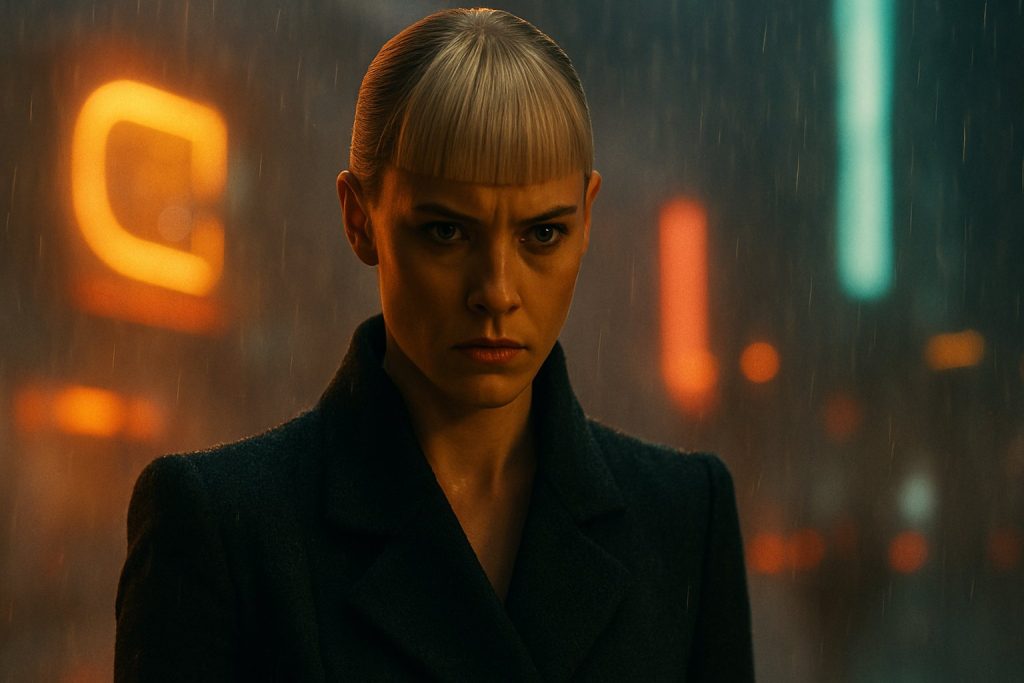
Luv (Scorpio) embodies the sign’s intensity and ruthless determination in service of her goals.
Luv embodies the core paradoxes of Scorpio. She possesses immense power and control, capable of sophisticated operations and brutal violence, yet seems driven by a deep-seated insecurity and a desperate need for Wallace’s approval – perhaps even his love, in her own twisted way. This aligns with Scorpio’s capacity for extreme loyalty and possessiveness, often stemming from a fear of betrayal or inadequacy. Her determination is unwavering; she pursues K relentlessly, employing both cunning and force. Scorpio is a fixed sign, known for its stubborn focus, and Luv never deviates from her mission until her final confrontation. Her moments of emotional vulnerability, like the single tear shed after killing Joshi or during her fight with K, reveal the hidden depths characteristic of water signs, particularly Scorpio, where still waters run deep and often conceal powerful currents of feeling.
Scorpio’s strengths include resourcefulness, bravery, passion, and loyalty. Luv demonstrates all of these in service to Wallace. However, the sign’s weaknesses – jealousy, distrust, secretiveness, manipulation, and potential for cruelty – are also starkly evident. Luv is clearly jealous of any perceived favor Wallace might show others (even the newly born replicant she witnesses him kill). She operates with manipulative precision, using psychological tactics as well as physical force. Her cruelty towards K and Joshi feels personal, fueled by a potent mix of duty, frustration, and perhaps a warped sense of superiority intertwined with deep insecurity. Luv represents the Scorpio archetype operating under immense pressure and control, her power and intensity ultimately turned towards destructive ends in service of a master who likely sees her as utterly disposable.
Niander Wallace: The Detached Visionary of Aquarius
Niander Wallace, the blind industrialist who resurrected replicant production after the Tyrell Corporation’s collapse, is the architect of Blade Runner 2049’s future. His chilling monologues and god-like pronouncements reveal a mind operating on a grand, almost inhuman scale, making him a compelling, if terrifying, fit for the fixed air sign Aquarius. Symbolized by the Water Bearer, Aquarius is associated with innovation, intellectualism, humanitarian ideals (often abstract), progress, and a certain emotional detachment or aloofness. They are the visionaries, the rebels, the thinkers concerned with the future and the collective, sometimes at the expense of the individual.
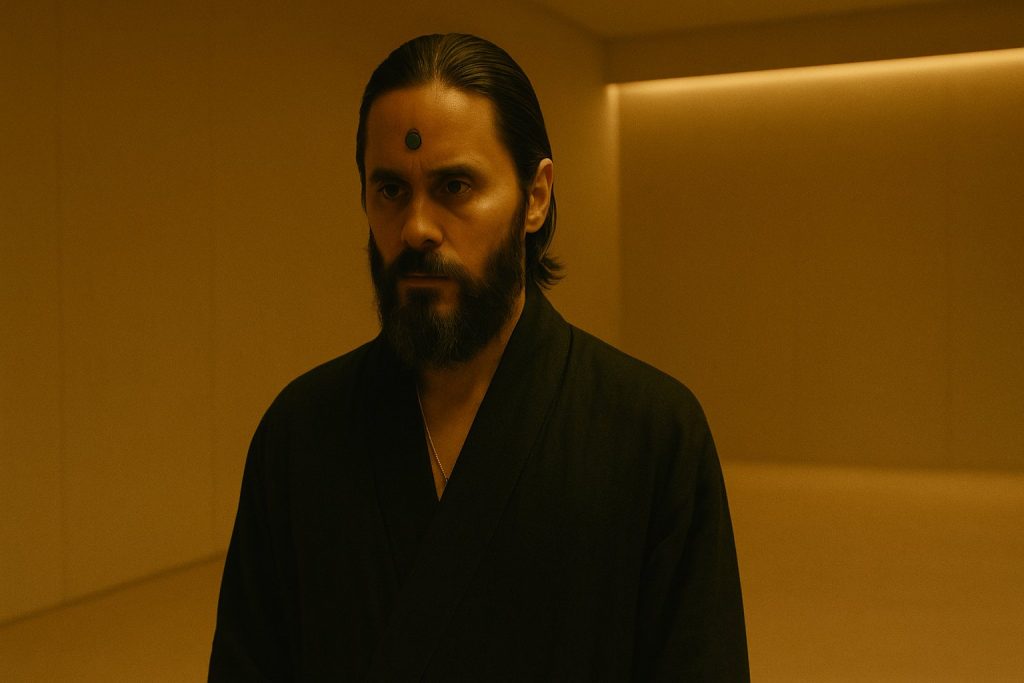
Niander Wallace (Aquarius) embodies the sign’s detached, visionary, and intellectually driven nature, operating from a place of cold logic.
Wallace embodies the potential shadow side of the Aquarian archetype. His vision is undeniably grand: creating replicant “angels” to facilitate humanity’s expansion across the stars, solving ecological collapse through synthetic means. This aligns with Aquarius’s forward-thinking and often humanitarian-focused goals. However, his approach is utterly detached and ruthless. He views his creations, even the seemingly perfect Luv, as mere tools, disposable assets in his cosmic game. His blindness, compensated by technological ‘eyes,’ further emphasizes his detachment from conventional human experience, perceiving the world through data rather than direct feeling. Aquarius is known for its intellectual prowess, and Wallace is clearly brilliant, philosophical, and articulate, but his intelligence lacks empathy. He operates from a place of cold logic and uncompromising vision, characteristic of Aquarius’s fixed nature and potential for stubbornness when convinced of their intellectual superiority.
Aquarius’s strengths include originality, independence, and intellectual brilliance. Wallace possesses these in abundance, having built an empire and conceived of solutions (however ethically dubious) to humanity’s problems. Yet, the sign’s weaknesses – emotional detachment, uncompromising stubbornness, aloofness, and a potential for fanaticism or a god complex – define his villainy. He runs from emotional expression, calmly ordering deaths and even committing them himself (like killing the newly born replicant) without flinching. His belief in his own unique destiny and right to play God is an extreme manifestation of Aquarian idealism twisted into megalomania. He represents the danger of prioritizing abstract ideals and intellectual concepts over the messy, emotional reality of individual lives, a chilling portrayal of the Aquarian visionary untethered from compassion.
Rick Deckard: The Enduring Bull of Taurus
Returning after thirty years in hiding, Rick Deckard, the protagonist of the original Blade Runner, carries the weight of decades on his shoulders. In Blade Runner 2049, he is a figure defined by weary resilience, isolation, and a stubborn refusal to be easily moved – qualities that resonate strongly with the fixed earth sign Taurus. Symbolized by the Bull, Taurus is known for its dependability, patience, practicality, and deep appreciation for stability and security, but also for its legendary stubbornness and resistance to change.

Rick Deckard (Taurus) stands his ground in the desolate ruins of Las Vegas, reflecting the sign’s endurance and connection to a fixed place.
Deckard’s life in the ruins of Las Vegas exemplifies the Taurean desire for a stable, albeit solitary, existence. He has created a semblance of security for himself, surrounded by simple comforts (his dog, his whiskey) and fiercely protective of his isolation. His decades-long hiding to protect his daughter, Ana, showcases immense Taurean patience and devotion, enduring loneliness for the sake of her safety. When K disrupts this carefully constructed solitude, Deckard’s initial reaction is gruff, suspicious, and resistant – the Bull digging in its heels against unwanted intrusion. He is grounded in the tangible realities of his past and present, less concerned with the grand philosophical questions that occupy Wallace or the existential angst that plagues K.
Taurus strengths include reliability, patience, devotion, and practicality. Deckard, despite his cynicism, demonstrates a deep loyalty to Rachael’s memory and an underlying protective instinct. He endures capture and interrogation by Wallace with a stubborn resilience. However, Taurean weaknesses like stubbornness, possessiveness, and resistance to change are also apparent. His world-weariness borders on pessimistic resignation, and his initial interactions with K are marked by mistrust. He clings to his solitude and the past. Yet, beneath the gruff exterior lies the Taurean capacity for steadfastness. He represents endurance, the ability to weather the storm and hold one’s ground, a necessary anchor in the shifting, uncertain world of Blade Runner 2049.
Lieutenant Joshi: The Authoritative Goat of Capricorn
Lieutenant Joshi, K’s superior at the LAPD, represents the unyielding structure and authority within the dystopian society of Blade Runner 2049. Her pragmatic, no-nonsense demeanor and unwavering commitment to maintaining order make her a strong fit for the cardinal earth sign Capricorn. Symbolized by the Sea-Goat, Capricorn is associated with discipline, responsibility, ambition, tradition, and excellent management skills. They are the builders and administrators of the zodiac, focused on maintaining structures and achieving long-term goals, often with a serious and reserved approach.
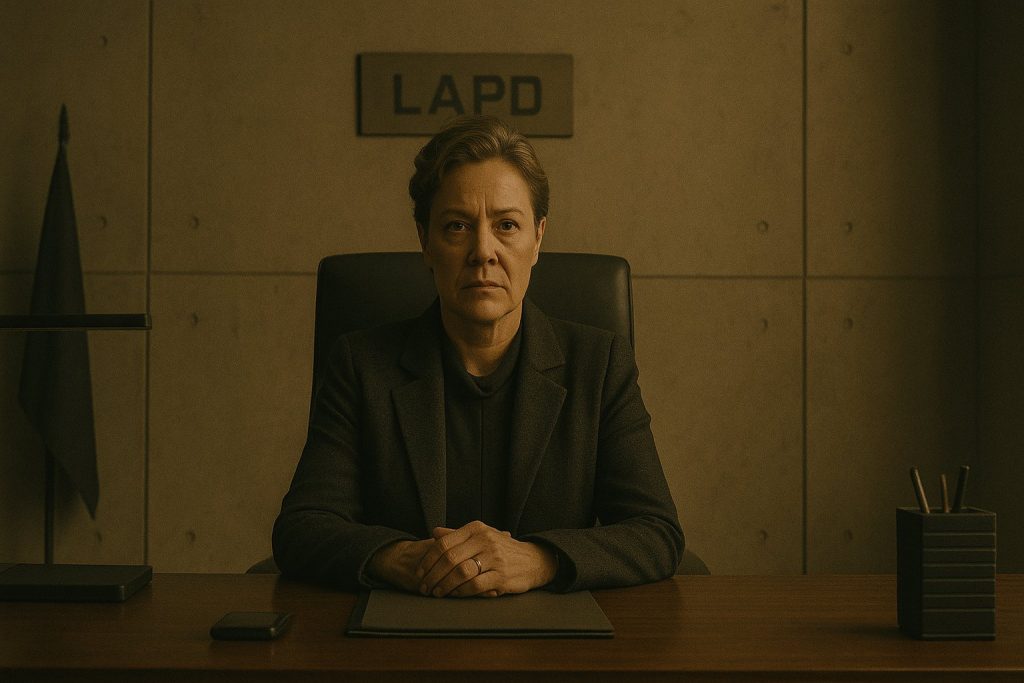
Lieutenant Joshi (Capricorn) commands authority from her LAPD office, reflecting the sign’s focus on structure, duty, and control.
Joshi embodies the Capricornian sense of duty and responsibility. Her primary concern is preserving the “wall” between humans and replicants, believing that revealing the secret of replicant birth would lead to chaos and war. She operates within the established hierarchy, giving orders clearly and expecting them to be followed without question. Her interactions with K, while showing moments of almost maternal concern (or perhaps proprietary interest), are ultimately governed by her role and the perceived needs of the system. She is pragmatic to a fault, ordering K to eliminate the replicant child without hesitation, viewing it as a necessary, albeit unpleasant, task to maintain societal stability. This aligns with Capricorn’s ability to make difficult decisions based on practical considerations rather than sentiment.
Capricorn’s strengths include responsibility, discipline, self-control, and resourcefulness. Joshi manages her division effectively and maintains control even under pressure. Her adherence to the rules and the status quo is absolute. However, Capricorn weaknesses can include being unforgiving, condescending, pessimistic, and overly focused on work or duty. Joshi can come across as cold and rigid, prioritizing the system over individual lives. Her worldview seems somewhat pessimistic, always expecting the worst outcome if the established order is disrupted. Yet, her final act – refusing to betray K’s location to Luv, even at the cost of her own life – demonstrates a powerful, if harsh, Capricornian integrity and unwavering adherence to her own code, protecting her subordinate and the secret she deemed critical to maintain, right to the bitter end.
Dr. Ana Stelline: The Sheltered Dreamer of Pisces
While her screen time is limited, Dr. Ana Stelline is the emotional and narrative core around which Blade Runner 2049 revolves. As the true child of Deckard and Rachael, hidden away due to a compromised immune system, she lives in a sterile bubble, crafting memories for Wallace Corporation’s replicants. Her existence is defined by isolation, creativity, and profound sensitivity, making her another compelling candidate for the water sign Pisces, just like K, the recipient of her most poignant memory. Pisces, the sign of empathy, imagination, and connection to the unseen, resonates deeply with Ana’s unique role and circumstances.
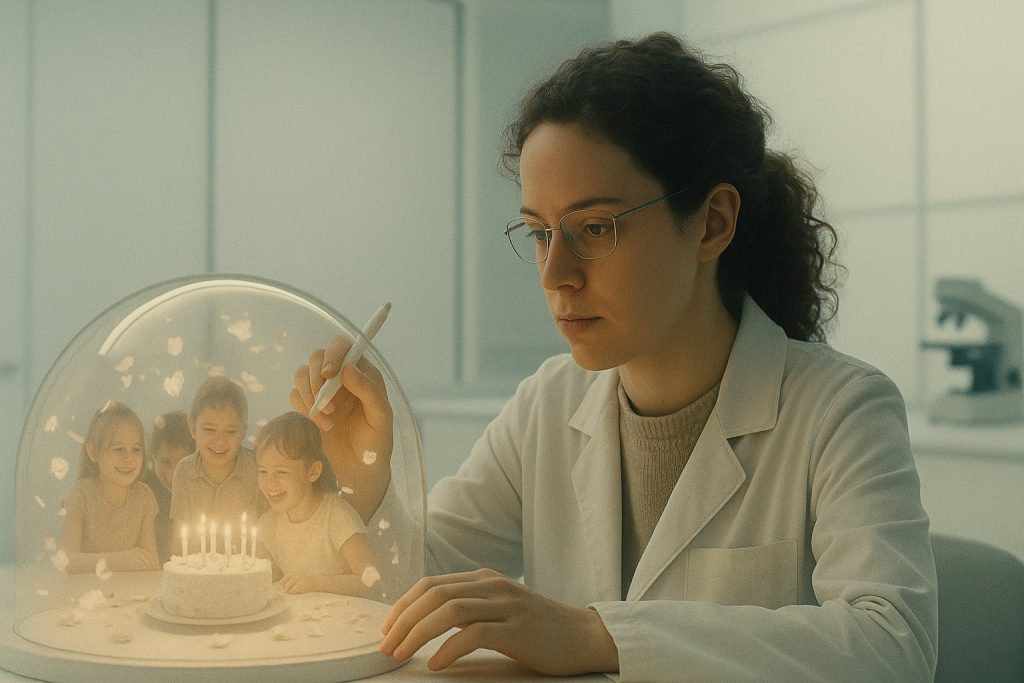
Dr. Ana Stelline (Pisces) crafts memories within her isolated environment, showcasing the sign’s creativity, sensitivity, and connection to inner worlds.
Ana’s life in a controlled environment, creating worlds within worlds through memory design, mirrors the Piscean tendency towards introspection and living in realms of imagination. Her work requires immense empathy and intuition – the ability to understand and synthesize experiences she has never directly had, crafting them into believable sensory realities for others. This creative and empathetic power is a hallmark of Pisces. She is gentle, sensitive, and carries an aura of melancholy, perhaps born from her isolation and the nature of her existence. When K confronts her, she displays Piscean sensitivity and compassion, understanding the weight of his discovery even as she confirms the memory is hers. Her tears are not just for herself, but for the pain the truth inflicts on K.
Pisces strengths are compassion, artistic talent, intuition, and gentleness, all evident in Ana. Her weakness might be seen in her enforced fragility and isolation, a physical manifestation of the Piscean vulnerability and potential difficulty navigating the harshness of the outside world. She lives through the dreams she creates, an ultimate Piscean existence. By sharing the sign with K, it creates a poignant link between the memory maker and the one who lived that memory, both embodying the Piscean themes of sacrifice, empathy, and the search for authenticity in a world that blurs the lines between the real and the artificial.
Conclusion: More Human Than Human Signs
From the searching soul of K as Pisces to the detached vision of Wallace as Aquarius, the intense focus of Luv as Scorpio, the adaptable charm of Joi as Gemini, the enduring resilience of Deckard as Taurus, the rigid authority of Joshi as Capricorn, and the hidden creativity of Ana as another facet of Pisces, the zodiac offers a fascinating lens through which to view the inhabitants of Blade Runner 2049. Assigning these astrological archetypes doesn’t diminish the complexity of Villeneuve’s characters or the profound questions the film raises about memory, identity, and the soul. Instead, it highlights the universal patterns of behavior and motivation that resonate within these figures, whether human or replicant.
Ultimately, Blade Runner 2049 challenges us to define what it means to be truly alive. By exploring these characters through the familiar language of the zodiac, we can connect their struggles – for freedom, for love, for purpose, for authenticity – to timeless human (and perhaps, replicant) experiences. Whether programmed, born, or something in between, these characters reflect archetypal energies that astrology has sought to understand for centuries. What do you think? Do these replicant signs resonate, or would you assign different cosmic connections? The search for meaning, it seems, continues both on Earth and off-world.
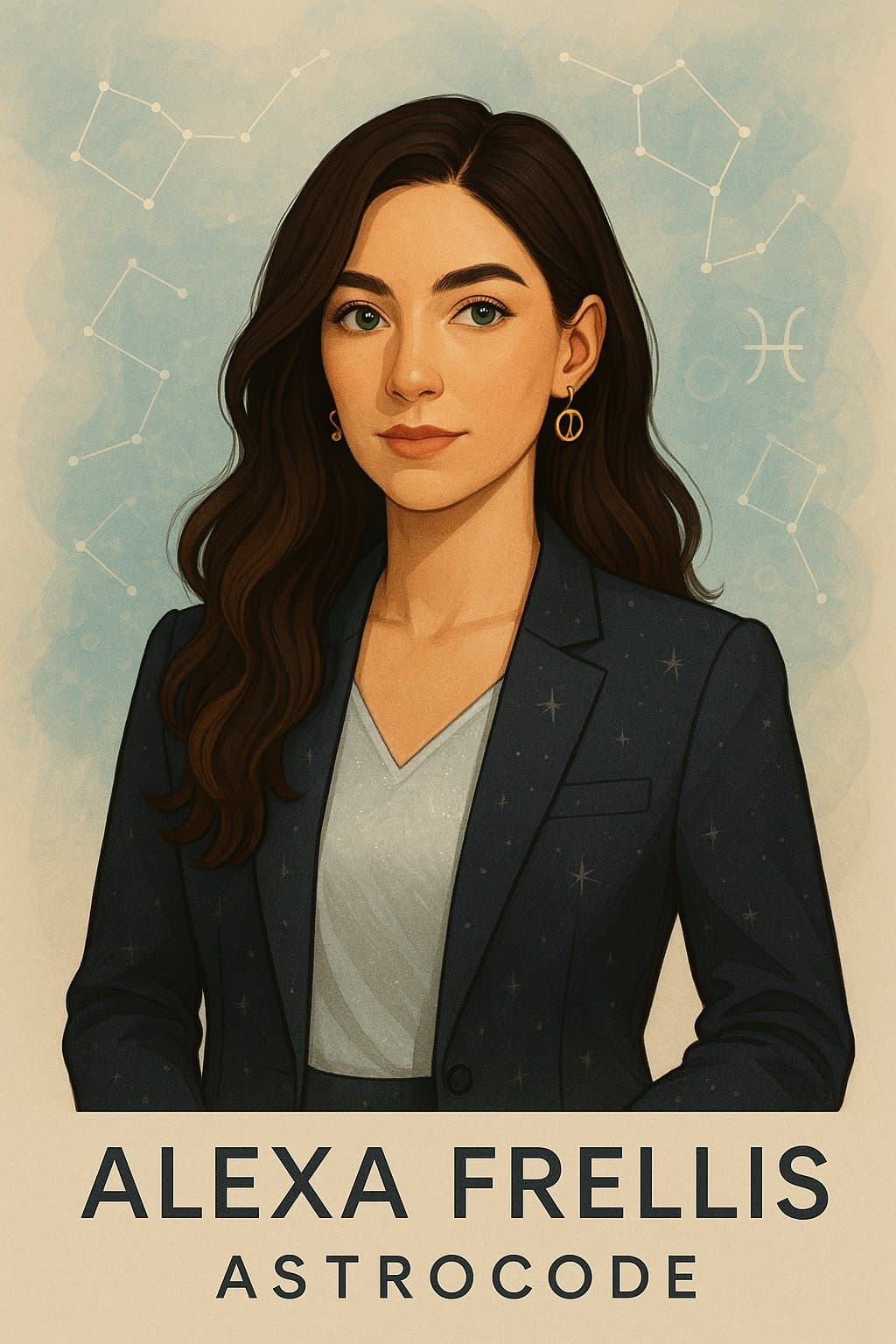
Alexa Frellis
Professional Astrologer
Alexa Frellis is a professional astrologer with over a decade of experience decoding the stars. Blending ancient wisdom with modern insight, she helps readers navigate life through cosmic guidance. When she's not writing, Alexa is charting birth maps, sipping herbal tea, or stargazing with her telescope.
Loved this article?
Save this post to your Pinterest boards for future reference or to share with friends
Save to Pinterest